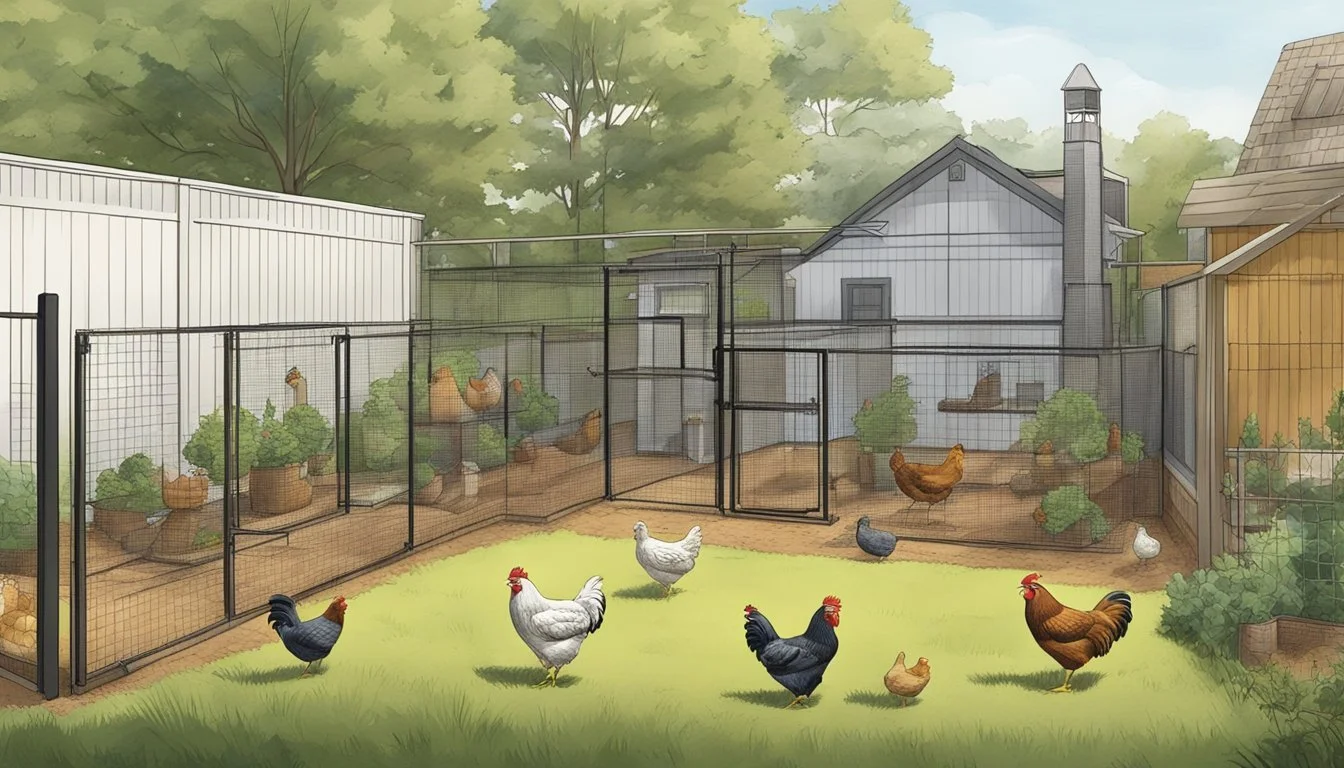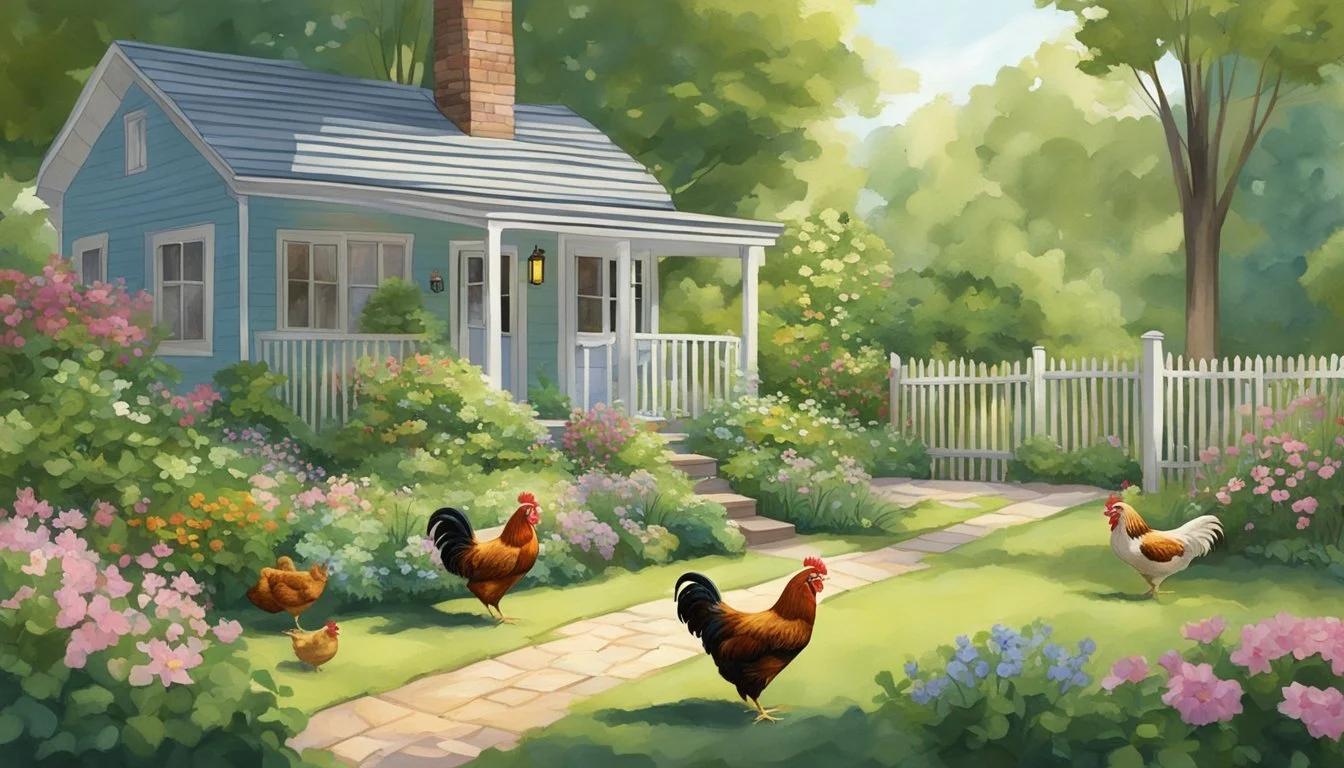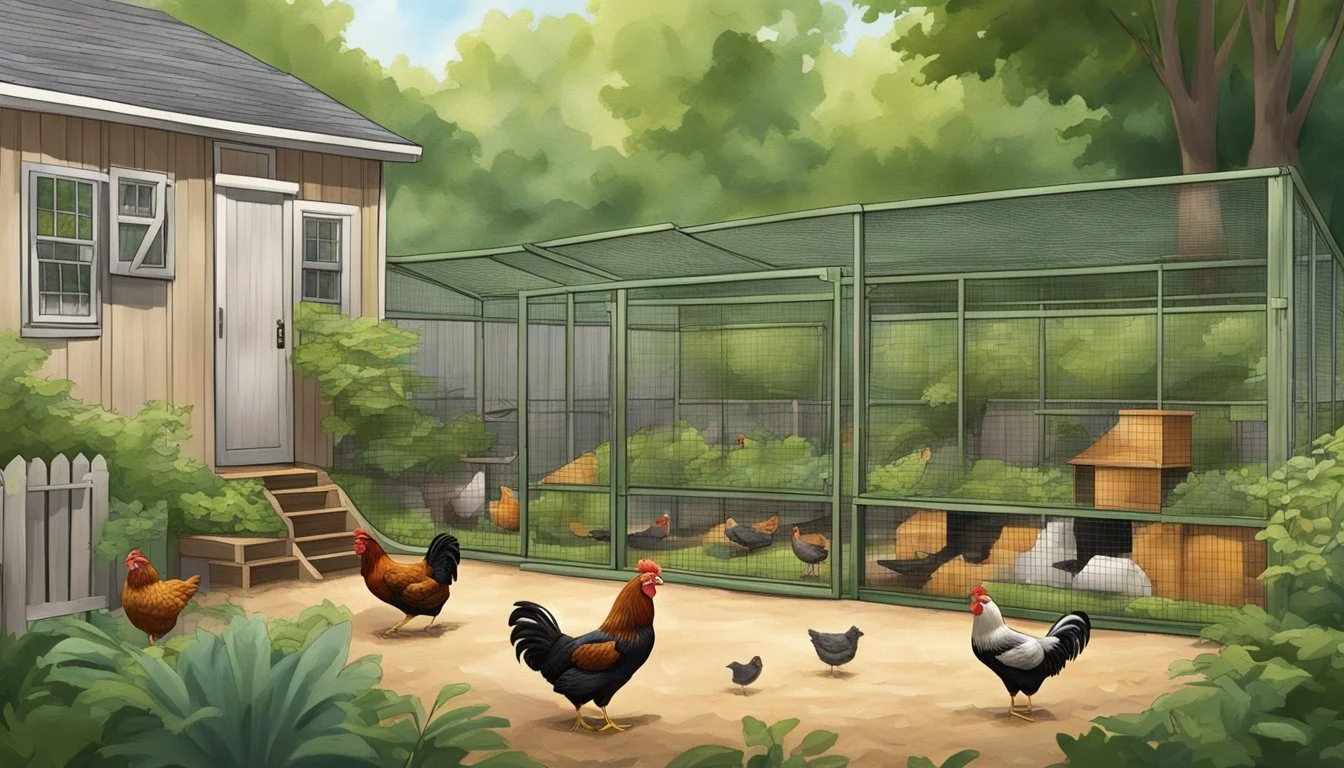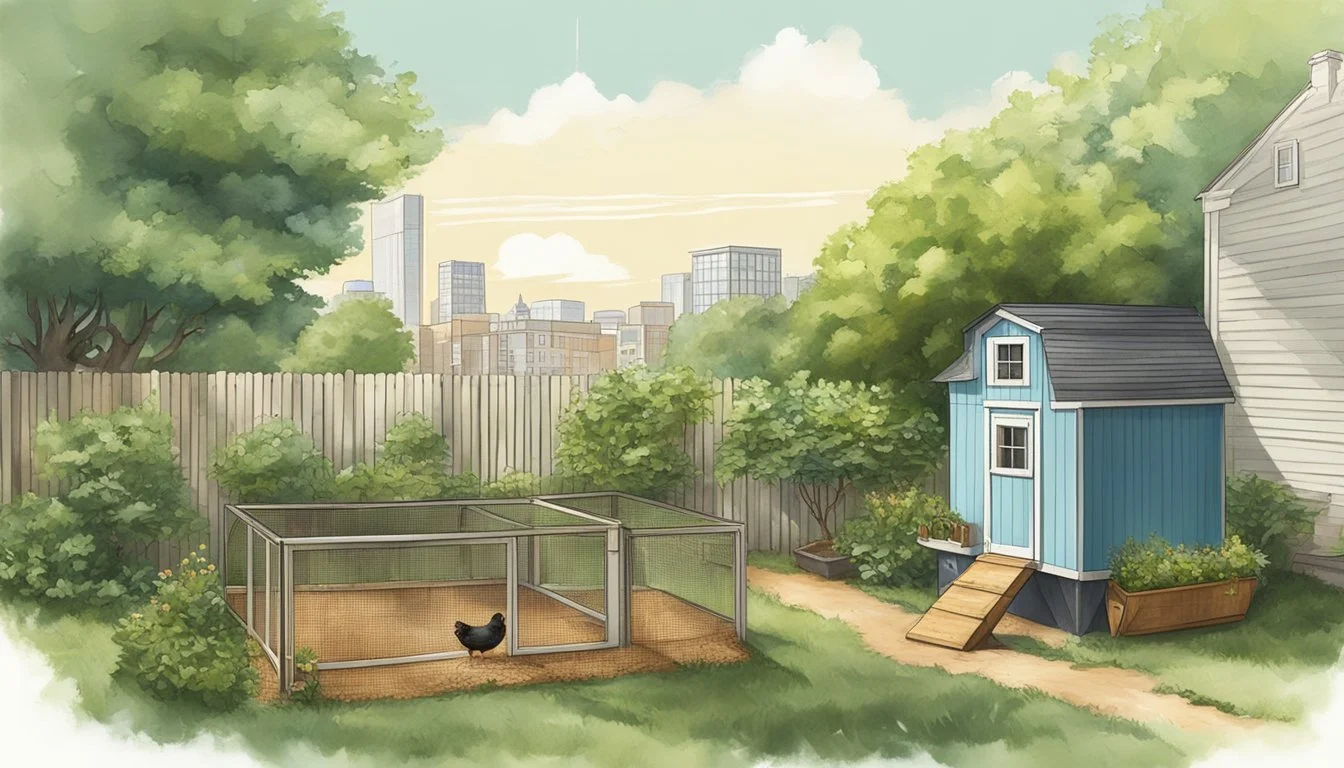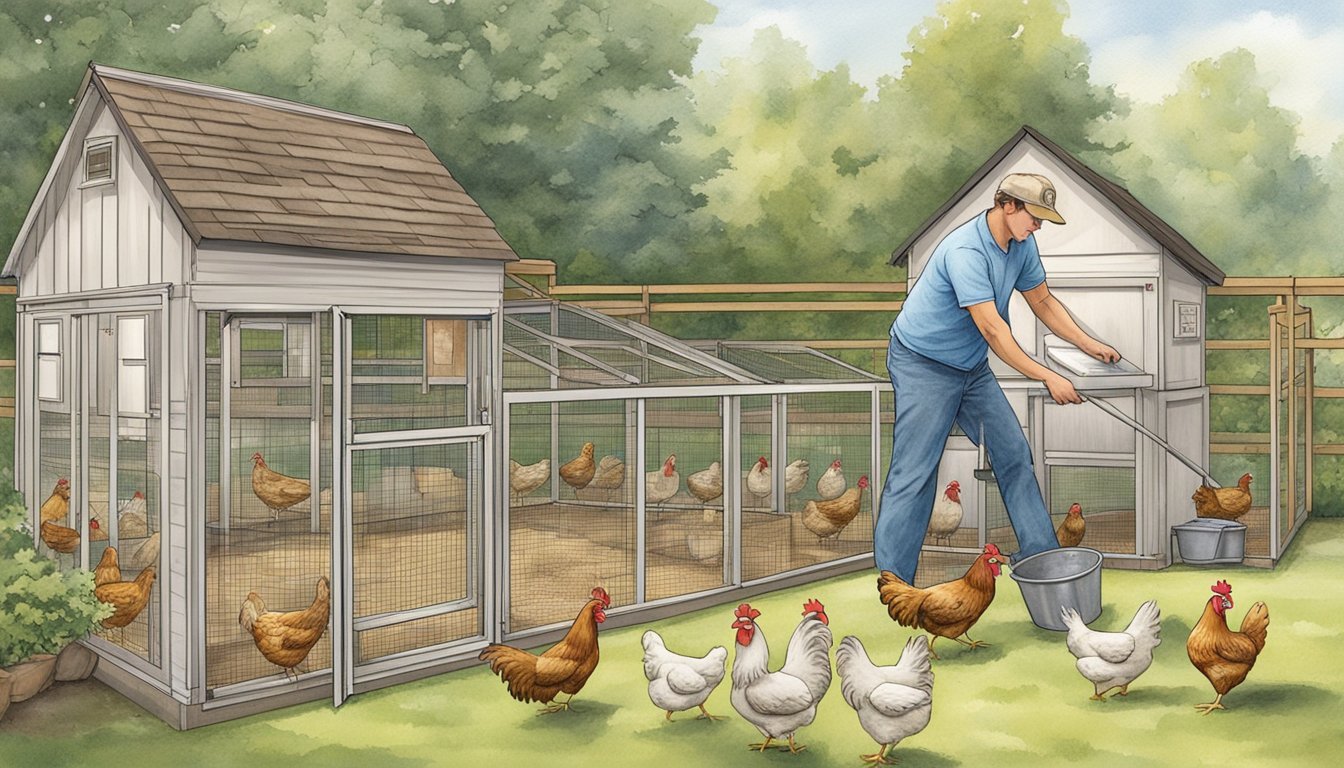Keeping Backyard Chickens in Richmond, VA
Essential Tips for Urban Poultry Farming
Raising backyard chickens in Richmond, Virginia, has become a popular practice for those seeking to embrace a more sustainable lifestyle and enjoy fresh eggs. In recent years, regulations have evolved to accommodate urban and suburban poultry enthusiasts, reflecting a growing trend across many cities. The City of Richmond permits residents to keep female chickens, subject to certain conditions and guidelines aimed at maintaining public health and neighborhood harmony.
Prospective and current chicken owners in Richmond must navigate a set of local ordinances tailored to balance the benefits of backyard chickens with the responsibilities of animal husbandry in a residential setting. It is essential to understand these laws to ensure that their small-scale flocks do not run afoul of local regulations. For instance, while female chickens are allowed within city limits, the presence of roosters is prohibited to prevent noise disturbances.
Before starting a flock, it is critical for residents of Richmond to acquire the necessary permits and familiarize themselves with the specific requirements regarding the number of hens allowed, coop construction, property boundaries, and waste management. By following these guidelines, chicken keepers can confidently contribute to their community, enjoying the rewards of raising chickens while respecting their neighbors and adhering to the city's animal care standards.
Legal Framework for Keeping Chickens
Before residents consider keeping backyard chickens in Richmond, VA, it is crucial to understand the local legal framework. This framework dictates permissible actions surrounding the ownership and management of chickens within city limits.
City and State Regulations
In Richmond, residents can keep up to six female chickens on their property, illustrating a proactive stance by the city towards urban agriculture. State laws complement these local ordinances, focusing on animal welfare and public health. Richmond's city code mandates that chickens have access to a clean coop and run area with fresh food and water to prevent the spread of diseases like avian flu.
City Council Involvement
The Richmond City Council plays a key role in the legislative aspect of backyard chicken keeping, with the power to amend and enforce ordinances. For instance, Ordinance 2013-17 was a significant amendment concerning the keeping of poultry within city limits. Communication with the council is advisable for citizens to stay informed on any policy changes.
Zoning and Permits
Zoning regulations are enforced to ensure that chickens do not become a nuisance or health hazard in residential areas. Chickens must be kept in accordance with specific spatial regulations; permits may be required for construction of chicken coops. To legally keep chickens, a permit must be obtained from the Animal Care and Control Commission (RACC) in Richmond, adhering to the city's zoning ordinance.
Starting with Chickens
When beginning the journey of backyard chicken keeping in Richmond, VA, it is essential to choose a suitable breed and understand the property requirements. These initial steps set the foundation for a successful and compliant chicken-keeping experience.
Choosing the Right Breed
Selecting the right breed of chickens is crucial. Not all breeds have the same temperament, size, egg-laying ability, and noise level. For residential areas in Richmond, quieter and smaller breeds are often preferable, such as the Plymouth Rock or the Rhode Island Red, which offer a balance between size, manageability, and egg production. Before making a choice, prospective chicken owners should research the specifics of each breed, considering:
Space: Some breeds require more space than others.
Temperament: A calm breed is ideal for close neighbors.
Egg production: Certain breeds lay more eggs, while others are known for their meat.
Climate adaptability: Some chickens better tolerate the Virginia climate.
Understanding Property Requirements
When it comes to setting up a space for backyard chickens, Richmond residents must adhere to local regulations. According to available information:
Number of Chickens: Property owners are typically allowed to keep up to 6 female chickens (hens).
Roosters: Keeping roosters is not permitted, likely to avoid noise complaints.
Space: Chickens need a coop and a fenced area for their protection. Coops should be placed at least 15 feet from the property lines and require a certain distance from the house to prevent any sanitation issues and minimize noise.
Land: The size of the land dictates the number of chickens that it can comfortably and legally accommodate.
Property Line: Understanding the exact property line is important when placing your coop to comply with local ordinances.
For a specific and detailed understanding of property requirements and to obtain the necessary permits, one should consult the Animal Care and Control Commission (RACC) or local authorities before purchasing or building a coop and starting a flock to ensure all guidelines are met precisely.
Coop Design and Location
In Richmond, VA, selecting the right coop design and pinpointing the ideal location are crucial steps for backyard chicken enthusiasts. Coop construction must adhere to specific guidelines to ensure the chickens' safety and comfort, and placement needs careful consideration to comply with local regulations and neighborly etiquette.
Coop Construction Guidelines
When constructing a chicken coop in Richmond, builders need to focus on several key requirements:
Predator Proofing: The coop must be secure from predators such as raccoons and foxes, including reinforced latches and wire mesh buried underground to prevent digging.
Ventilation: Proper airflow is essential to remove moisture and ammonia, keeping the chickens healthy. Use hardware cloth or mesh for windows to ensure ventilation while preventing predator access.
Cleaning: The design should facilitate easy cleaning to maintain hygiene, with removable trays or a design that allows someone to enter and clean the coop easily.
Roosts and Nesting Boxes: Chickens need a place to sleep and lay eggs. Roosts should be positioned higher than nesting boxes, and at least one nesting box for every three to four hens is recommended.
Here's a brief list illustrating the basic coop requirements:
Component Requirement Walls Solid, predator-resistant Floor Raised, with removable cleaning tray Roosts 2 inches wide, allow 8-10 inches per bird Nesting Boxes Min. of 1 box per 3-4 hens Windows Covered with secure wire mesh Access Doors Lockable, with sturdy latches
Placement and Neighborhood Considerations
Choosing the coop's location involves not only the welfare of the chickens but also the surrounding human residents. Consider the following:
Distance from Residences: Local regulations may dictate how far the coop must be from neighboring residential buildings to minimize noise and odor issues.
Sunlight and Shade: Position the coop so that it gets natural light but also has shaded areas to protect chickens from excessive sun.
Drainage: Ensure the area has good drainage to avoid water accumulation, which can lead to health problems for the chickens.
Visibility: Place coops discreetly to maintain the neighborhood aesthetic and avoid potential disputes with neighbors.
Richmond may have specific coop restrictions regarding maximum sizes of structures and whether roosters are permitted, which can affect noise levels. It's critical to review and comply with these local stipulations before building or placing a coop.
Daily Management and Care
Proper daily management and care are crucial for the health and productivity of backyard chickens in Richmond, VA. These routines help to ensure the chickens are safe, healthy, and able to provide a steady supply of fresh eggs.
Feeding and Nutrition
Chickens require a balanced diet consisting of proteins, carbohydrates, vitamins, and minerals. Feed them a high-quality commercial poultry feed as it is designed to provide all the necessary nutrients.
Fresh Food: Supplement their diet with garden scraps and fresh produce to keep them healthy.
Clean Water: Ensure they always have access to fresh, clean water to prevent dehydration.
Regular feeding schedules contribute to maintaining the animals' health, promoting consistent egg production, and preventing nuisance behaviors due to hunger or malnutrition.
Health and Well-being
Regular check-ups are important to monitor the chickens' health and swiftly address any issues. Chickens need to be kept clean to prevent diseases and parasites, which implies:
Clean Coops: Regular cleaning of the coop is necessary to prevent the buildup of waste and to avoid attracting pests.
Space To Roam: Adequate space is crucial for their well-being. Overcrowding can lead to stress and illness among them.
Compliance with chicken laws in Richmond is a non-negotiable aspect of care to avoid legal issues and potential nuisance complaints from neighbors. This involves adhering to local regulations on the number of chickens allowed and ensuring roosters, known for causing noise, are not kept if they're forbidden by law. Neglecting the care of backyard chickens not only harms the animals but can also have legal repercussions.
Common Restrictions and Requirements
When keeping backyard chickens in Richmond, VA, residents must be aware of the specific local ordinances that dictate the number of chickens allowed and the legal requirements for ownership. Adherence to these regulations is crucial to avoid penalties.
Number and Sex of Chickens Allowed
In the City of Richmond, individuals are permitted to have up to six female chickens on their property. This allows residents to enjoy the benefits of fresh eggs without causing significant disruption in urban environments. Importantly, male chickens, or roosters, are not permitted due to noise considerations.
Max chickens allowed: 6
Female chickens only: Yes
Roosters: Not allowed
Legal Compliance and Penalties
To legally keep chickens, one must obtain a permit from the Richmond Animal Care and Control Commission (RACC). This compliance step ensures the welfare of the animals and adherence to animal-cruelty laws. Failure to comply with the proper ordinances can result in penalties, including fines. Residents must constantly stay updated with the chicken ordinance as policies can change, impacting how one must maintain their backyard flock.
Permit requirement: Mandatory
Ordinance reference: City Code 10-88 and others
Penalties: Fines for non-compliance
It's the responsibility of the chicken owner to stay informed about the latest regulations and to ensure their backyard chicken-keeping practices are in alignment with city restrictions and legal obligations.
Benefits and Challenges of Urban Hen Keeping
Urban hen keeping in Richmond, VA, presents an array of benefits and potential challenges for city dwellers. This practice can enrich the local ecosystem and foster community but also requires mindful management to mitigate issues.
Positive Contributions to Local Ecosystem
Backyard chickens contribute to local ecosystems by providing natural fertilizer through their manure, which can be composted and used to enhance soil fertility. Furthermore, they help with pest control, as they feed on various insects and reduce the need for chemical pesticides.
Fertilizer: Chicken manure is rich in nitrogen, phosphorus, and potassium.
Pest Control: Chickens eat bugs like ticks, beetles, and larvae, thus curbing their population.
Potential Issues and Resolutions
Noise and harm to or from domestic animals are potential challenges that urban hen owners face. Yet, these issues have viable solutions.
Noise: Chickens typically make less noise than dogs. However, noise can be further minimized by not keeping roosters and by strategically locating coops away from neighbors.
Predators: Cats and dogs can pose a threat to urban hens. Secure coops and fenced runs are recommended to protect chickens from domestic and wild predators.
Harmony with Neighbors: Regulations often require certain distances from other homes, and keeping the coop clean minimizes smells and keeps neighbors content.
By addressing these challenges with informed solutions, urban residents of Richmond can responsibly enjoy the benefits of backyard chicken ownership.
Application and Inspection Process
In Richmond, VA, individuals interested in keeping backyard chickens must navigate the permit application and ensure they meet inspection standards. This ensures compliance with local ordinances and humane care for the chickens.
How to Apply for a Permit
Residents must submit an application for a conditional use permit to the local government. The application process involves:
Contacting Richmond City Council at 900 E. Broad St., Suite 200, Richmond, VA 23219, or at the contact number (804)646-7955.
Completing the application which may require personal information, property details, and a plan for the chicken coop.
Submitting the application along with any applicable fees.
Additional information for the application may be requested to clarify the intended use and management of the chickens.
Inspection Requirements and Expectations
After submitting the permit application, the property is subject to an inspection by the Richmond Animal Care and Control (RACC). Inspection criteria include:
Fenced Area Distance: Ensuring the coop is at least 200 feet from property lines.
Coop Specifications: Verifying the coop provides adequate space, shelter, and security for the chickens.
Sanitation: Assessing the cleanliness of the area to prevent odors and pests.
Residents must be prepared for the possibility of follow-up inspections to ensure ongoing compliance.
Community and Support
In Richmond, VA, the support for urban chicken keeping reflects a growing community interest in sustainable living and local food initiatives. This increase in popularity has led to a vibrant network of advocates and support groups, alongside examples from neighboring areas which offer valuable lessons and frameworks for successful backyard chicken endeavors.
Local Advocacy and Support Groups
Local advocacy for backyard chickens in Richmond has been a prominent factor driving policy discussion. Support groups provide forums for enthusiasts to share tips, resources, and advocate for more hen-friendly regulations. The Richmond Food Policy Task Force, a key player in this movement, has been instrumental in promoting urban agriculture. They have worked closely with the City Council to evaluate and propose changes that could foster a supportive environment for backyard chickens.
Planning Commission: Engages with citizen groups to assess how backyard chicken keeping aligns with city zoning and planning.
City Council President: As an elected official, can play a pivotal role in representing community interests in the policy-making process.
Learning from Neighboring Areas
Richmond can draw insights from the experiences of neighboring areas like Henrico County and Chesterfield County where regulations and community attitudes towards backyard chickens vary. Both areas serve as useful benchmarks for evaluating the potential challenges and benefits that Richmond might encounter.
Henrico County: Their approach to coop size, placement, and the number of chickens allowed provides a regulatory framework that Richmond could emulate or adapt.
Chesterfield County: Experiences from here could inform Richmond's policies about problem-solving and community engagement around the topic.
Within Richmond's own borders, the Fan District has shown a burgeoning interest in urban agriculture, which could stimulate more neighborhood-level support systems and potential pilot projects for backyard chickens. Community meetings and workshops hosted in the area could serve as platforms for knowledge exchange and for gauging resident sentiments.
Additional Resources
The Additional Resources section provides specific details on where individuals can find comprehensive information on backyard chicken keeping in Richmond, Virginia, contacts for assistance, and legislative updates that might affect chicken keepers in the region.
Where to Find More Information
For residents seeking detailed guidance on backyard chicken regulations, they may explore the websites of backyard chicken advocacy groups or agricultural extensions. Additionally, a wealth of information is readily available on community forums and at local libraries where books and guides on poultry laws can be found.
Key Online Resources:
BackYard Chickens: Richmond Virginia Chicken Ordinance
ChickenLaws.com: Virginia Chicken Laws
City Contacts for Assistance
Richmond residents can directly contact the Richmond City Council or the Department of Animal Care and Control for personalized assistance with regulations and permits associated with keeping backyard chickens.
Essential Contacts:
Contact Name Department Phone Address Richmond City Council Richmond City Hall (804)646-7955 900 E. Broad St., Suite 200, Richmond, VA 23219 Animal Care and Control Richmond Animal Care and Control (804)646-5573 1600 Chamberlayne Ave, Richmond, VA 23222
Legislation Updates
It is important for chicken keepers to stay informed about any zoning changes or updates to chicken laws, including ordinances on the number of chickens allowed, coop specifications, or annual fees. Keepers should regularly check the Richmond City Council's meeting minutes or contact council representatives.
Important Links:
Richmond City Council Meeting Minutes: Richmond City Meetings
Updated Legislation: Keep an eye on local news for any zoning change or updates in the legislation regarding backyard chickens.
Frequently Asked Questions
This section addresses common inquiries and clarifies important aspects of keeping backyard chickens in Richmond, VA.
Common Concerns Addressed
Permit Requirements: Residents are required to obtain a permit from the Animal Care and Control Commission (RACC) to keep chickens on their property legally.
Number of Chickens Allowed: The City of Richmond allows residents to keep up to 6 female chickens.
Rooster Regulations: Keeping roosters within city limits is not permitted, to avoid noise complaints and maintain neighborhood tranquility.
Housing Specifications: A secure and suitable coop is necessary to protect chickens from predators and provide shelter from the elements. Coops must also comply with local ordinances regarding size and placement.
Local Ordinances: City and county-specific ordinances must be adhered to, and prospective chicken keepers should check with local government offices for any additional restrictions or updates to regulations.


